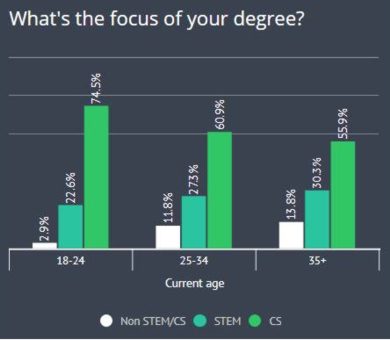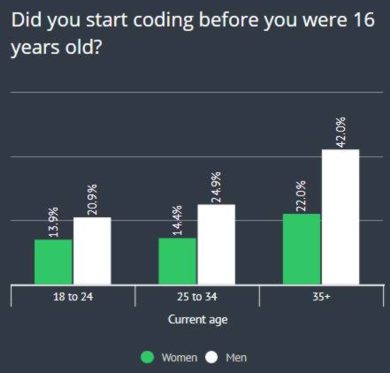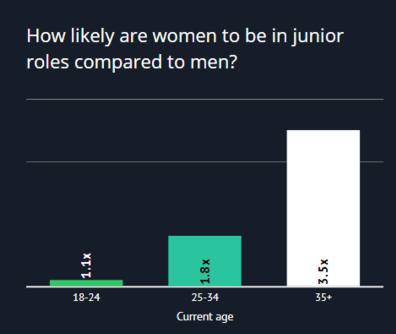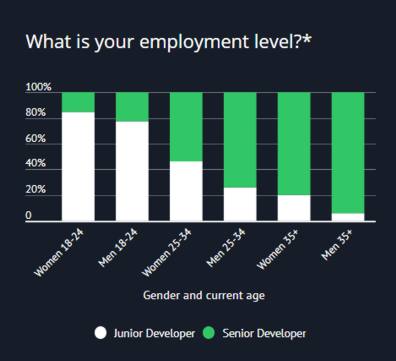| Women In Tech - Towards Gender Parity |
| Written by Janet Swift | |||
| Thursday, 08 March 2018 | |||
|
Today is International Women's Day, a key date in the ongoing campaign for gender parity, and this year's theme is #PressforProgress. HackerRank has published findings relating to gender inequality in software development which indicates some signs of progress. HackerRank is a developer hiring platform that relies on coding challenges to help companies evaluate developers based on their skills as opposed to their resumes. It has a global community of professional and student developers. HackerRank’s Women in Tech 2018 Report is based on the responses of 14,616 professional developers (1,981 women and 12,635 men) to a 10-minute online survey conducted in October 2017. This report provides insights into generational differences among women developers which suggest two ways in which the gender gap between male and female developers is shrinking. There has been a striking increase in the popularity of computer science as a field of study for women. As this chart, which compares women currently aged 18-24, with those aged 25-34 and those 36 and older shows, three quarters of those in the youngest group opted for computer science and only 3% chose a non STEM-subject. This is very different from the oldest age group in which 56% studied CS and 14% a non-STEM subject.
The report notes: It used to be that many female software developers came from a variety of different majors outside of Computer Science and STEM (Science, Technology, Engineering or Math). And men were more likely to take CS than women. Today that’s changing. One reason often used to explain the lower uptake of Computer Science by girls was that they were less likely than boys to have experience of coding prior to embarking on their degrees, leaving girls at a disadvantage. While this situation has now changed, it is because there has been a marked decline in "early coding".
The report notes: As a result of the PC Revolution, kids of the 1980s were especially curious to learn how to code at a young age. Over time, as technology has been embedded in society, the drive to start coding before the age of 16 has been declining overall. Meanwhile, an interesting trend is taking shape in parallel. By the time students enroll in CS 101 today, young men and women more likely to start on equal footing than older generations. More specifically, there was a 20 percentage point gap between men and women over 35 who began coding before 16 years old. Today that gap has shrunk down to just 7 percentage points. According to the report women now represent the majority (53%) of new CS grads and junior developers entering the workforce. Moreover, the report gives reason for optimism that progress is being made towards greater parity in terms of career advancement. The depressing statistic from Women in Tech is that women are far more likely to be in junior positions than men and that over 20% of women over the age of 35 are still in junior positions which is 3.5 times more than men. However, when you look at the two younger age groups the multiplier isn't so severe - 1.8 for thise aged 25-34 and just 1.1 for those younger than 24:
So, as shown below, almost 20% of women under 24 have progressed from Junior developer to a more senior role, almost on a par with their male counterparts. It is to be hoped that this parity can be maintained as the women entering the profession today continue in their careers.
HackerRank told I Programmer: The report shines a light on the strides that have been made and exposes where there's still work to be done to even the playing field and foster more diversity and inclusion in tech. The findings are starting points for a bigger conversation about the opportunity for companies to drive change - from raising awareness around the unconscious biases that impact hiring decisions to creating workplaces and implementing policies that are inclusive and give women clear pathways to grow in their careers and become leaders. Visit International Women's Day 2018 to discover more about its #PressforProgress campaign.
Related ArticlesNever Too Early To Code According to HackerRank Where to Find Top Women Coders Celebrating International Women's Day 2016 To be informed about new articles on I Programmer, sign up for our weekly newsletter, subscribe to the RSS feed and follow us on Twitter, Facebook or Linkedin.
Comments
or email your comment to: comments@i-programmer.info |
|||
| Last Updated ( Sunday, 08 March 2020 ) |




 * HackerRank defined junior developers as Level 1 software engineers. Senior developers are grouped as anyone with the title of senior, manager, director, VP or C-level.
* HackerRank defined junior developers as Level 1 software engineers. Senior developers are grouped as anyone with the title of senior, manager, director, VP or C-level.

